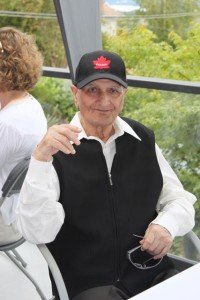By GAGANDEEP GHUMAN
Published: July 10, 2016
Published: July 10, 2016
GURDEV (Dave) Singh Biln, one of the first Sikh pioneers to have settled in Squamish, passed away with his family on his side on May 17 in North Vancouver following a short illness. He was 92 years old and survived his wife, Swaran Kaur Biln, by 40 days. He was predeceased by his parents, sister and three brothers and by his son Kalwant Singh (Bill) Biln in 1998. He is survived by daughters Jessie Maan (Rajindra), Kallie Biln and son Jaswant Singh Biln (Marion) and by 10 grandchildren, 15 great-grandchildren and many nieces and nephews.
Gurdev was born in the village of Ferozepur, Punjab, India. He was schooled by Moslem scholars in nearby towns and completed Grade 10, which was quite an achievement for a villager in that era. He attained proficiency in Urdu, Hindi, Farsi, Punjabi and English. 

After marrying in the late 1930’s, Gurdev worked as a bank clerk until moving to Lahore (now Pakistan) in 1945 to oversee the finances and payroll of the Lahore Police Force. An astute businessman, he and Swaran Kaur joined his father in Fiji in 1948 to operate a general store. He moved to Canada in 1959 and worked at various mill towns in the Cariboo until he came to Squamish in 1963 to work at Empire Mills as a lumber grader until his retirement in 1988. His son Singh Biln said his father was an enterprising person who dreamt big and didn’t shy away from hard work that involved big risks. In the 1950s, his cousin urged him to migrate to Canada to seek a better education and a better life for his children.
In 1959, Baldev and his wife came to Canada and Sing Biln recalls the car trip to the Cariboo, where they moved in with their cousin in Clinton. A month later, the family moved into a cabin at the mill town of Chasm. Biln recalls how his father hitchhiked from one town to the other getting casual jobs at the mills, sometimes taking his family along with him. The family moved to the town of Ashcroft where they lived in a small company house at the mill and later moved to Lac La Hache, where Gurdev Biln worked double shifts for the extra money, coming home often in the morning at 1 am. Singh Biln recalls that the school at this community was on the highway about two miles walking distance and kids from other communities were brought in by bus but about 20 kids had to walk to the end of the lake, cross the bridge and then walk up the lake to the school. The company decided to build a foot bridge over the shallow portion of the lake to reduce the walking distance by half.
“Dad and a carpenter built the 300-foot long bridge and I recall being so proud of him every time we crossed that bridge,” says Singh Biln. In early 1962, Gurdev got work at the Canadian Collieries sawmill that had opened in Squamish and is reported to be the second South Asian hired behind the late Mohinder Singh Mahnger. Within a month he purchased a new 1963 Chevrolet Biscayne as he knew a car was needed to visit us at Lac La Hache and go to Vancouver to shop or visit relatives. Housing was scarce in Squamish and most men rented rooms but a month later a house came available which Biln bought, becoming the first South Asian homeowner in Squamish.
Recalling an early incident, daughter Kellie says that a few days after the coupled moved to town, Biln had to leave to fight a forest fire near Pemberton. Swaran Kaur was left all alone in a new town with no groceries and little money. “The true welcoming nature of this community quickly became apparent as established neighbors like the Armstrongs, Wilsons, Hurrens and Butterworths brought her groceries, furniture and even toys for her son. She knew then that Squamish would be her home for a long time,” says Kellie.
Once they decided to make a new life in Squamish, their house became the hub of South Asian activity. Gurdev Biln added two more rooms to the two bedrooms and also put in a garden in the backyard so the family was never short of fresh vegetables. Over the next few years, Gurdev bought acouple of houses downtown and rented them to single South Asians so they were de facto ‘Hindu bunkhouses’. These few houses were the beginnings of my father’s real estate ventures which included buying, selling, building over 60 properties over the next 20 years, including a motel on Scott Crescent at the base of Hospital Hill. The motel was run by the whole family and resulted in many friends who stayed there, some on long term. In particular, were South Asians from Fiji who needed a place to stay before they got their own place. he says. “Our father was hard working as he had his full-time job as a lumber grader at the sawmill and developed houses almost as a hobby. He still found time to spend time with the family on outings to Paradise Valley or into Vancouver or visiting relatives in the interior,” remembers Singh Biln.
Gurdev Biln worked at the mill for 25 years and retired at age 65 in 1988. After retirement, he continued to manage his real estate holdings that included a commercial building on 2nd Avenue. He helped his children build or renovate their own homes in Squamish.
“Dad had become quite a hockey fan and seldom missed watching games on TV. He walked several miles every evening in Garibaldi Estates until his knees gave out. He then spent more time watching hockey and Sikh religious programs on TV. He also faithfully recorded sunrise and sunset times every day but I never figured out why,” says his son Singh Biln.



